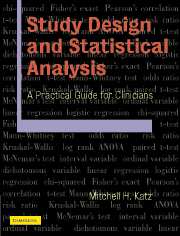Book contents
- Frontmatter
- Contents
- Preface
- 1 Introduction
- 2 Designing a study
- 3 Data management
- 4 Univariate statistics
- 5 Bivariate statistics
- 6 Multivariable statistics
- 7 Sample size calculations
- 8 Studies of diagnostic and prognostic tests (predictive studies)
- 9 Statistics and causality
- 10 Special topics
- 11 Publishing research
- 12 Conclusion
- Index
6 - Multivariable statistics
Published online by Cambridge University Press: 05 August 2012
- Frontmatter
- Contents
- Preface
- 1 Introduction
- 2 Designing a study
- 3 Data management
- 4 Univariate statistics
- 5 Bivariate statistics
- 6 Multivariable statistics
- 7 Sample size calculations
- 8 Studies of diagnostic and prognostic tests (predictive studies)
- 9 Statistics and causality
- 10 Special topics
- 11 Publishing research
- 12 Conclusion
- Index
Summary
What is multivariable analysis? Why is it necessary?
Multivariable analysis is a statistical tool for determining the unique (independent) contributions of various factors to a single event or outcome. It is an essential tool because most clinical events have more than one cause and a number of potential confounders.
For example, we know from bivariate analysis that cigarette smoking, obesity, a sedentary life style, hypertension, and diabetes are associated with an increased risk for coronary artery disease.
But are these risk factors independent of one another? By independent, we mean, that the risk factor predicts the outcome even after taking the other risk factors into account. Conversely, is it possible that these risk factors only appear to be related to coronary artery disease because the relationship between the risk factor and the outcome is confounded by a third factor. Perhaps the only reason that lack of exercise is associated with decreased coronary artery disease is that smokers exercise less and because they exercise less they become obese, and their obesity leads to higher blood pressure and greater insulin resistance.
The question of whether a risk factor is independently associated with an outcome is of more than academic significance. For example, if the association of exercise and coronary artery disease is confounded by smoking, then encouraging people to exercise more will not change their risk of coronary artery disease.
Conversely if the impact of exercise on coronary artery disease is independent of smoking status, then exercising more will lower the risk of coronary artery disease even if the person continues to smoke.
Information
- Type
- Chapter
- Information
- Study Design and Statistical AnalysisA Practical Guide for Clinicians, pp. 120 - 126Publisher: Cambridge University PressPrint publication year: 2006
